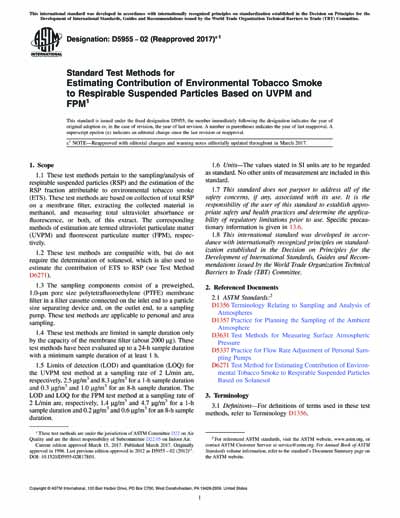Historical
ASTM D5955-02(2017)e1
Standard Test Methods for Estimating Contribution of Environmental Tobacco Smoke to Respirable Suspended Particles Based on UVPM and FPM
1.1 These test methods pertain to the sampling/analysis of respirable suspended particles (RSP) and the estimation of the RSP fraction attributable to environmental tobacco smoke (ETS). These test methods are based on collection of total RSP on a membrane filter, extracting the collected material in methanol, and measuring total ultraviolet absorbance or fluorescence, or both, of this extract. The corresponding methods of estimation are termed ultraviolet particulate matter (UVPM) and fluorescent particulate matter (FPM), respectively.
1.2 These test methods are compatible with, but do not require the determination of solanesol, which is also used to estimate the contribution of ETS to RSP (see Test Method D6271).
1.3 The sampling components consist of a preweighed, 1.0-μm pore size polytetrafluoroethylene (PTFE) membrane filter in a filter cassette connected on the inlet end to a particle size separating device and, on the outlet end, to a sampling pump. These test methods are applicable to personal and area sampling.
1.4 These test methods are limited in sample duration only by the capacity of the membrane filter (about 2000 μg). These test methods have been evaluated up to a 24-h sample duration with a minimum sample duration of at least 1 h.
1.5 Limits of detection (LOD) and quantitation (LOQ) for the UVPM test method at a sampling rate of 2 L/min are, respectively, 2.5 μg/m3 and 8.3 μg/m3 for a 1-h sample duration and 0.3 μg/m3 and 1.0 μg/m 3 for an 8-h sample duration. The LOD and LOQ for the FPM test method at a sampling rate of 2 L/min are, respectively, 1.4 μg/m 3 and 4.7 μg/m3 for a 1-h sample duration and 0.2 μg/m3 and 0.6 μg/m3 for an 8-h sample duration.
1.6 Units—The values stated in SI units are to be regarded as standard. No other units of measurement are included in this standard.
1.7 This standard does not purport to address all of the safety concerns, if any, associated with its use. It is the responsibility of the user of this standard to establish appropriate safety and health practices and determine the applicability of regulatory limitations prior to use. Specific precautionary information is given in 13.6.
1.8 This international standard was developed in accordance with internationally recognized principles on standardization established in the Decision on Principles for the Development of International Standards, Guides and Recommendations issued by the World Trade Organization Technical Barriers to Trade (TBT) Committee.
Content Provider
ASTM International [astm]






